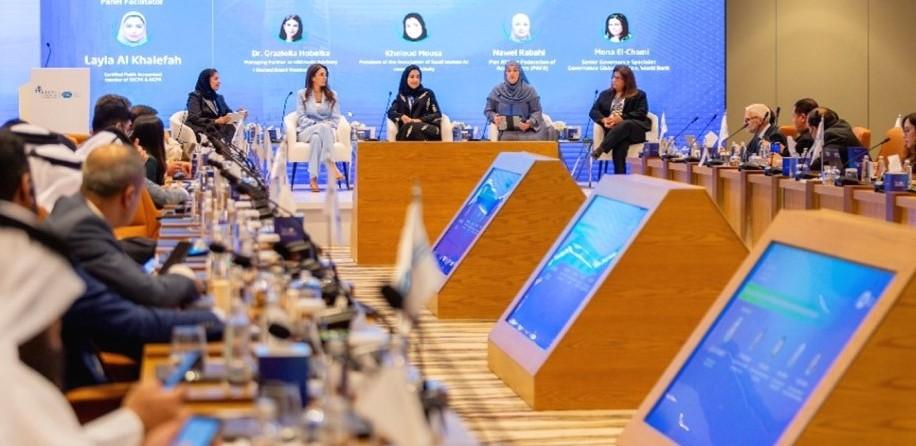
At IFAC Connect MENA 2025 in Riyadh, four inspiring women came together to share a message that resonated deeply with audiences across the region: advancing women in the accountancy profession is not just about opportunity, it is about sustainability, credibility, and impact.
Moderated by Layla Al Khalefah of SOCPA, the session “Attracting and Retaining Talent in MENA: Advancing Women in the Accountancy Profession” brought together Kholoud Mousa (KPMG and ASWA), Mona El-Chami (World Bank), Dr. Graziella Hobeika (LACPA), and Nawel Rabahi (PAFA). Each shared practical strategies and personal reflections on how professional accountancy organizations (PAOs), firms, and policymakers can help unlock the potential of women across the region.
Their collective message was clear: women’s advancement in the profession is essential for the future of the profession itself. Below are key themes and insights from their discussion and a call to move from advocacy to action.
Creating Systems That Work for Everyone
Image
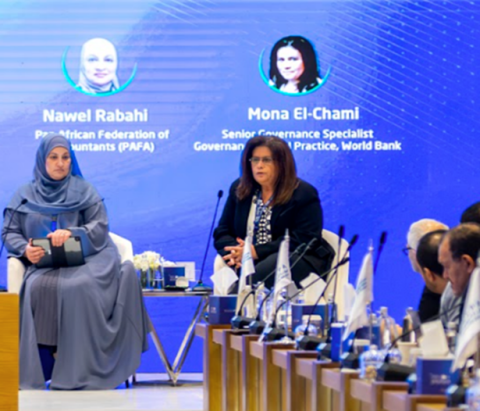
For Mona El-Chami, Senior Governance Specialist at the World Bank, inclusion must start at the systems level. “Advancing women in the accountancy profession works best when inclusion is embedded in systemic reforms rather than treated as an add-on,” she emphasized.
Mona shared how countries that integrate inclusion within governance and accountability reforms often see tangible results. “Creating enabling environments through capacity building, digital tools, and institutional accountability, ensures that policies translate into action and open doors for women to thrive,” she noted.
She highlighted that when governments and regulators link fiscal transfers or reporting incentives to inclusion targets, the impact becomes measurable and sustainable. “Policy levers such as equity indicators make gender inclusion both visible and achievable,” Mona said.
Her message was direct: for meaningful progress, inclusion must be intentional, measurable, and built into how institutions operate. “PAOs, firms, and development partners must move beyond advocacy and embed inclusion into their core strategies and governance frameworks. By aligning talent development with systemic reforms, we can create pathways that advance women and ensure sustainable progress.”
Building Credibility, Confidence, and Sponsorship
Image
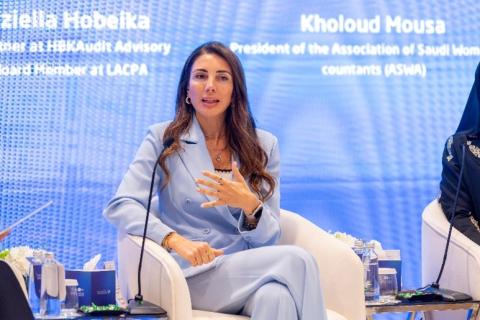
Dr. Graziella Hobeika, Managing Partner at HBK Audit Advisory and the only woman currently serving on the Board of the Lebanese Association of Certified Public Accountants (LACPA), knows firsthand that leadership rarely comes by invitation.
“Based on my own journey, to be in a leadership position, a woman doesn’t have to wait to be invited. She has to seek new roles, ask for opportunities, and keep investing in herself,” she said. “Credibility is essential. As a woman in this profession, you often have to work harder to be heard and taken seriously. But once credibility is established, I never felt that being a woman held me back.”
Dr. Hobeika emphasized that the journey to leadership requires both persistence and advocacy. “Mentorship is guidance, but sponsorship is advocacy,” she explained. “It’s when someone with influence puts their reputation behind you and opens doors.”
Her call to PAOs is clear: go beyond training and create structured sponsorship programs that identify and prepare women for leadership positions. “Our initiative at LACPA shows that many women have both the skills and the desire to contribute… they simply need someone to put their name forward and create space for them to lead.”
Mentorship, Partnership, and the Power of Regional Networks
Image
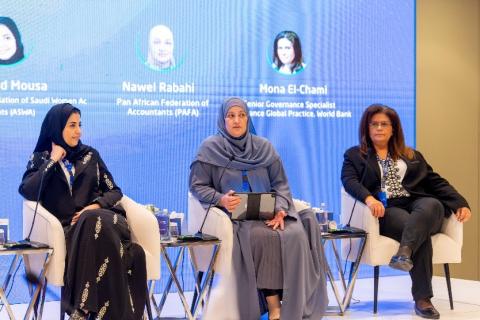
Nawel Rabahi, Director at Cabinet Rabahi in Algeria and Advisor to the Pan African Federation of Accountants (PAFA), spoke passionately about mentorship and partnership as catalysts for sustainable change.
“Advancing women in the accountancy profession is not just about creating opportunities; it is about ensuring sustainable growth and impactful change for future generations,” Nawel said.
Drawing on her work with PAFA and regional networks, she explained that strong links between PAOs, firms, and universities can create a “chain of empowerment” that helps women progress into leadership positions. “Mentorship programs have dramatically closed the gap between ambition and achievement, making it possible for young women to truly get ahead,” she noted.
Her advice to PAOs and firms was both practical and hopeful: “Take the message from advocacy into action by developing strategies that embed inclusion into governance frameworks. When we make the contributions of women visible and valued, we build stronger, more resilient institutions.”
From the First to the Future: Building Communities of Inclusion
Image
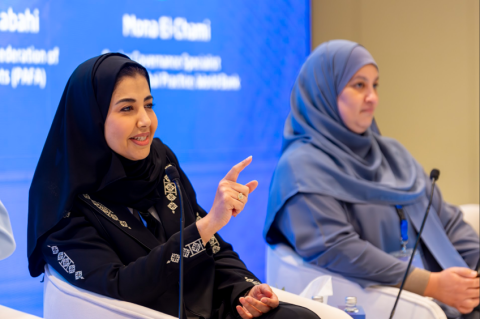
Kholoud Mousa, Saudi Arabia’s first female CPA, Audit Partner at KPMG, and Founder of the Association of Saudi Women Accountants (ASWA), brought a perspective that combines personal experience and institutional impact.
Through ASWA, she has built a platform that empowers women in accounting and finance from university classroom to Board room through mentoring, training, and community engagement. Her leadership demonstrates how one individual’s initiative can ripple across an entire profession.
For Kholoud, inclusive leadership is not about quotas; it is about creating spaces where women can contribute meaningfully. She believes that firms and PAOs must cultivate visibility and networks that allow women to see themselves reflected in leadership. “Community matters,” she often says. “When women see others leading, they believe they can too.”
Her vision extends beyond Saudi Arabia. “We are no longer talking about ‘firsts.’ We are talking about what comes next… building systems where women’s participation is the norm, not the exception.”
A Collective Call to Action
Across the region, the conversation is shifting from whether to include women, to how to sustain and expand their leadership. As these panelists made clear, the future of the profession depends on it.
Professional accountancy organizations, firms, and development partners each have a role to play:
- PAOs can embed gender inclusion into their strategic plans, create sponsorship programs, and measure progress transparently.
- Firms can cultivate inclusive leadership pipelines and ensure women are represented in decision-making roles.
- Development partners and regulators can provide the policy and financial incentives that make reform sustainable.
As Layla Al Khalefah concluded during the session, “attracting and retaining talent, particularly advancing women in leadership, is not a ‘nice to have.’ It is a critical success factor for the sustainability of the profession in this region.”
The women of IFAC Connect MENA 2025 showed what leadership looks like… collaborative, resilient, and committed to the public interest. Their stories remind us that every barrier removed for one woman opens the door for many more to follow.
Because when women rise, the profession rises with them.
